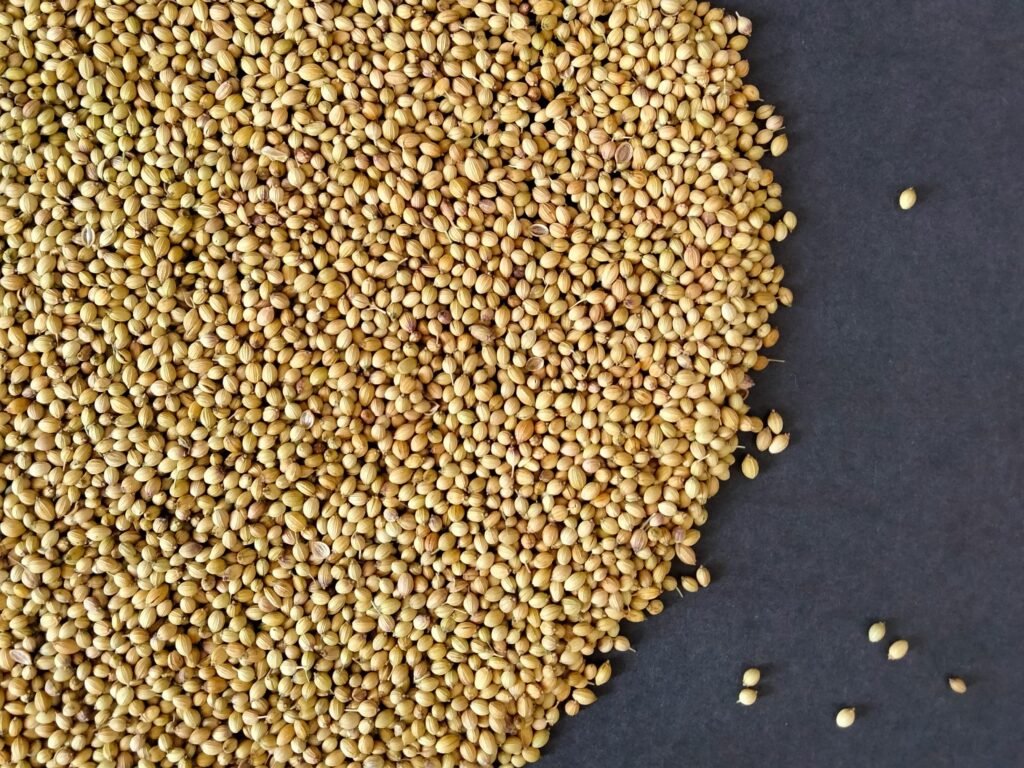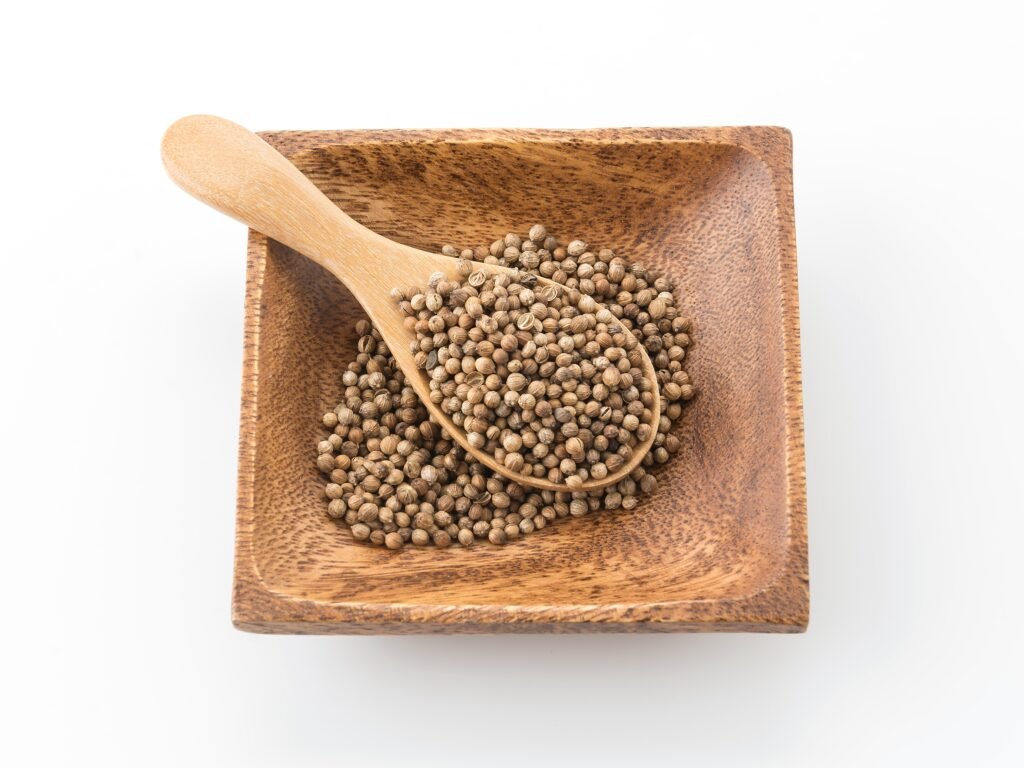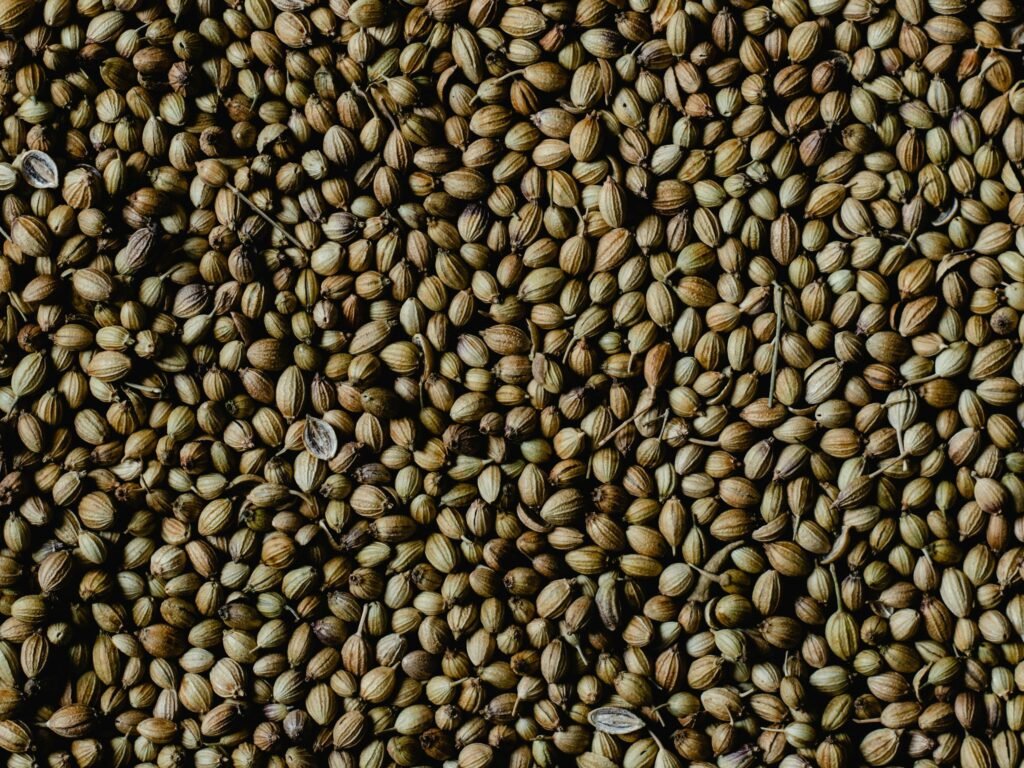Table of Contents
Coriander, a versatile herb commonly used in cuisines worldwide, holds a storied history deeply rooted in culinary and medicinal traditions. Join us as we delve into the rich tapestry of coriander’s health benefits, exploring its role in digestion, immunity, heart health, and beyond. Whether you’re a culinary enthusiast seeking to elevate your dishes or someone interested in harnessing the power of herbs for health and vitality, coriander offers a wealth of possibilities. Let’s embark on this aromatic and flavourful journey together and discover the wonders of coriander for health and wellness.
Coriander, scientifically known as Coriandrum sativum, has a rich and ancient history that dates back thousands of years. Believed to be native to regions spanning from Southern Europe through the Mediterranean to Southwest Asia, coriander has been cultivated and utilized by various civilizations since antiquity.
Evidence of coriander’s use can be traced back to ancient civilizations such as Ancient Egypt, where it was employed both as a culinary herb and a component of embalming practices. The herb’s versatility and medicinal properties led to its widespread adoption by cultures across the globe, including ancient Greece, Rome, and India.
Coriander’s popularity as a culinary ingredient and medicinal herb continued to flourish over the centuries, with its seeds and leaves featuring prominently in diverse cuisines, herbal remedies, and traditional medicines. Today, coriander remains a beloved and ubiquitous herb in kitchens worldwide, prized for its distinctive flavour and potential health benefits.
NUTRITIONAL VALUE

Coriander, both in its fresh leafy form (cilantro) and dried seeds, offers a modest yet notable nutritional profile. Cilantro leaves are particularly rich in vitamins and minerals, providing a significant source of vitamin K, vitamin C, and provitamin A (beta-carotene), which support bone health, immune function, and vision, respectively. Additionally, cilantro contains small amounts of folate, potassium, and manganese.
Coriander seeds are a good source of dietary fiber, offering digestive benefits, and contain essential minerals such as calcium, iron, magnesium, and phosphorus, which are essential for bone health, muscle function, and energy metabolism. Moreover, coriander seeds contain trace amounts of antioxidants and essential oils, including linalool and terpinene, which contribute to their distinctive aroma and potential health-promoting properties. Incorporating coriander into your diet adds both flavour and nutritional value to your meals.
HEALTH BENEFITS

Coriander, a versatile herb with both culinary and medicinal uses, offers a wide range of potential health benefits attributed to its rich nutritional profile and bioactive compounds.
DIGESTIVE HEALTH
Coriander contains compounds like cineole and terpinene, which have been shown to promote digestion by stimulating digestive enzymes and reducing gastrointestinal inflammation. Its high fiber content aids in regulating bowel movements, preventing constipation, and promoting overall digestive health.
ANTI-INFLAMMATORY EFFECTS
Coriander contains antioxidants and anti-inflammatory compounds, such as quercetin and kaempferol, which help reduce inflammation throughout the body. This may benefit conditions like arthritis, inflammatory bowel diseases, and cardiovascular disease by alleviating pain and swelling.
HEART HEALTH
Coriander seeds contain heart-healthy nutrients like potassium, which helps regulate blood pressure by counteracting the effects of sodium. Additionally, coriander may help lower LDL (bad) cholesterol levels and increase HDL (good) cholesterol levels, reducing the risk of heart disease and stroke.
BLOOD SUGAR CONTROL
Preliminary studies suggest that coriander may help regulate blood sugar levels and improve insulin sensitivity. Compounds like quercetin and polyphenols found in coriander seeds may help lower blood glucose levels, making it potentially beneficial for individuals with diabetes or insulin resistance.
ANTIMICROBIAL PROPERTIES
Coriander exhibits antimicrobial properties that may help combat bacterial and fungal infections. Compounds like dodecenal and citronellol found in coriander oil have been shown to inhibit the growth of pathogens responsible for foodborne illnesses and skin infections.
ANTI-ANXIETY EFFECTS
Coriander contains compounds like linalool, which has been found to possess anxiolytic (anxiety-reducing) properties. Incorporating coriander into your diet or using coriander essential oil in aromatherapy may help reduce stress, promote relaxation, and improve mood.
BONE HEALTH
Coriander is a good source of calcium, magnesium, and vitamin K, all of which are essential for maintaining bone health and preventing osteoporosis. Regular consumption of coriander may help strengthen bones and reduce the risk of fractures.
EYE HEALTH
Coriander is rich in vitamin A and antioxidants like beta-carotene, lutein, and zeaxanthin, which are essential for maintaining healthy vision and protecting against age-related macular degeneration and cataracts.
SKIN HEALTH
Coriander contains compounds like linoleic acid and vitamin C, which help promote collagen synthesis and skin elasticity. Applying coriander oil topically or consuming coriander internally may help improve skin texture, reduce signs of ageing, and alleviate skin conditions like acne and eczema.
DETOXIFICATION
Coriander may support the body’s natural detoxification processes by aiding in the elimination of toxins and heavy metals. Compounds like cilantro (coriander) extract have been studied for their potential chelating properties, which may help remove heavy metals from the body.
PRECAUTIONS

While coriander is generally safe for most people when consumed in moderate amounts as a culinary herb, there are certain precautions and potential drawbacks to consider, especially for certain individuals. Here are detailed precautions and cons associated with coriander:
ALLERGIC REACTIONS
Some individuals may be allergic to coriander, experiencing symptoms such as skin rash, itching, swelling, or difficulty breathing upon exposure. Allergic reactions to coriander are relatively rare but can occur in individuals with sensitivities to other plants in the Apiaceae family, such as celery, parsley, or fennel.
CROSS-REACTIVITY
Individuals with allergies to certain pollens or other plants may experience cross-reactivity with coriander. For example, individuals with birch pollen allergy may be more likely to experience oral allergy syndrome (OAS) when consuming coriander due to similarities in protein structures between birch pollen and certain plant foods, including coriander.
SKIN SENSITIVITY
Some individuals may experience skin irritation or allergic reactions upon contact with coriander leaves or seeds, particularly when handling fresh herbs. This may manifest as contact dermatitis or allergic contact dermatitis, characterized by redness, itching, and inflammation of the skin.
GASTROINTESTINAL UPSET
In rare cases, consuming large amounts of coriander or coriander seeds may cause gastrointestinal discomfort, including nausea, vomiting, diarrhoea, or abdominal pain. This may be due to the presence of certain compounds in coriander, such as cineole and terpinene, which can irritate the stomach lining in sensitive individuals.
BLOOD CLOTTING
Coriander contains compounds that may have mild blood-thinning effects, such as coumarins. While this may be beneficial for individuals at risk of blood clots, such as those with cardiovascular disease, it may pose a risk of increased bleeding in individuals taking anticoagulant medications or undergoing surgery. It’s essential for these individuals to monitor their intake of coriander and consult with a healthcare professional.
DRUG INTERACTIONS
Coriander supplements or extracts may interact with certain medications, including anticoagulants, antidiabetic drugs, and medications metabolized by the liver. Compounds in coriander may enhance or inhibit the effects of these medications, leading to potential side effects or interactions. Individuals taking medication should consult with their healthcare provider before using coriander supplements or extracts.
PREGNANCY AND BREASTFEEDING
While coriander is generally considered safe for consumption in culinary amounts during pregnancy and breastfeeding, there is limited research on its safety in medicinal doses or concentrated forms such as supplements or essential oils. Pregnant or breastfeeding women should exercise caution and moderate their consumption of coriander to avoid potential adverse effects.
KIDNEY STONES
Coriander contains oxalates, compounds that may contribute to the formation of kidney stones in susceptible individuals. Individuals prone to kidney stones or with a history of kidney stone formation should moderate their intake of coriander, particularly coriander seeds, which have higher oxalate content.
INCORPORATING CORIANDER INTO YOUR DIET

Incorporating coriander into your diet not only adds flavour and aroma to your meals but also provides potential health benefits. Here are several detailed ways to use coriander in your cooking:
- Fresh Herb Garnish: Finely chop fresh coriander leaves (cilantro) and use them as a garnish for a variety of dishes, including soups, salads, curries, stir-fries, and tacos. The fresh, citrusy flavour of cilantro adds a burst of freshness and colour to your meals.
- Herbaceous Salad Dressings: Blend fresh cilantro leaves with olive oil, lemon juice or vinegar, garlic, and spices to create a flavourful herbaceous salad dressing. Drizzle the dressing over mixed greens, grain salads, or roasted vegetables for a vibrant and refreshing touch.
- Flavourful Marinades: Incorporate ground coriander seeds into marinades for meats, poultry, seafood, or tofu. Combine coriander with other spices like cumin, paprika, garlic, and ginger, along with citrus juice or yoghurt, to create a flavourful marinade that tenderizes and infuses your protein with aromatic flavours.
- Spice Blends and Rubs: Create homemade spice blends and rubs using ground coriander seeds as a key ingredient. Combine coriander with spices like cumin, chilli powder, turmeric, and black pepper to make versatile blends for seasoning meats, vegetables, or legumes before grilling, roasting, or sautéing.
- Fragrant Rice Dishes: Add whole coriander seeds or ground coriander to rice dishes such as pilafs, biryanis, or fried rice for a fragrant and aromatic flavour. Toasting coriander seeds before adding them to the rice enhances their flavour and releases their essential oils.
- Homemade Salsas and Chutneys: Blend fresh cilantro leaves with tomatoes, onions, garlic, chilli peppers, lime juice, and spices to create vibrant salsas and chutneys. Serve these flavourful condiments with grilled meats, fish, and tacos, or as a dip for tortilla chips or pita bread.
- Flavourful Soups and Stews: Add chopped fresh cilantro leaves or ground coriander seeds to soups, stews, and broths for added depth of flavour. Coriander pairs well with ingredients like tomatoes, coconut milk, lentils, chickpeas, and root vegetables in hearty and comforting dishes.
- Aromatic Curries and Stir-Fries: Incorporate ground coriander seeds into curry pastes, sauces, and stir-fries to impart a warm and aromatic flavour. Combine coriander with other spices like ginger, garlic, turmeric, and garam masala for authentic Indian, Thai, or Middle Eastern-inspired dishes.
- Homemade Flatbreads and Crackers: Add ground coriander seeds to homemade bread dough, flatbread dough, or cracker dough for a subtle yet distinctive flavour. Coriander-infused bread or crackers pair well with dips, cheeses, soups, or as a base for sandwiches and wraps.
- Refreshing Beverages: Blend fresh cilantro leaves with fruits, vegetables, and herbs to create refreshing smoothies, juices, or mocktails. The bright and citrusy flavour of cilantro complements ingredients like pineapple, mango, lime, cucumber, and mint for a revitalizing and nutritious drink.
In conclusion, coriander emerges as a remarkable herb that not only enhances the flavour of dishes but also offers a plethora of potential health benefits. From aiding digestion and reducing inflammation to supporting heart health and promoting detoxification, coriander possesses a diverse range of therapeutic properties that have been celebrated for centuries.
Incorporating coriander into your diet, whether as fresh cilantro leaves or dried seeds, offers a flavourful and aromatic way to potentially improve your overall well-being. However, it’s essential to use coriander as part of a balanced diet and consult with a healthcare professional if you have any underlying health conditions or are pregnant or breastfeeding.
With its rich history, culinary versatility, and potential medicinal properties, coriander stands as a valuable addition to any kitchen and a flavourful ally in your journey toward holistic health and wellness. Whether you’re garnishing salads, seasoning curries, or blending herbal teas, coriander provides a delicious and aromatic touch to your culinary creations while potentially supporting your health and vitality.

